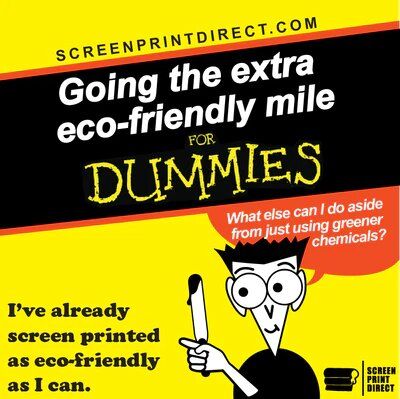
Eco-Friendly Printing: Sustainable Business Tips

Eco-Friendly Screen Printing
Eco-friendly screen printing and really any business practices should be prioritized no matter what type of company you are running. Our staff of screen-printers have developed their own environmentally friendly screen printing practices and are here to share. Let’s dive into 7 simple things you can do to start eco friendly t shirt printing today. We will divide this list into two parts. First, eco-friendly screen-printing techniques and practices. Second, eco friendly screen printing supplies that you should be using.
BEFORE WE DIVE INTO OUR LIST LET'S DISCUSS IN GENERAL, IS SILK SCREEN PRINTING ECO-FRIENDLY?
The answer is not as simple as yes and no. Screen Printing is done with a lot of “chemicals” however you can put the work in to make sure you are using chemicals with little to no impact on the environment. How sustainable t shirt printing is, is determined by you and the silk-screening methods you adopt as a business owner. Eco-friendly screen printing can be done if you choose an eco-friendly silk screen printing supplier.
ECO-FRIENDLY SCREEN-PRINTING TECHNIQUES
Stop using single use ink scrapers. When you use a single use scraper you are creating more trash and landfill. Swap to a scraper, ink spatula, or old credit card that can be washed and used again to scrap off the ink. We sell scrapers for .99 cents, and this can be used 100’s of times, no excuses.

Make use of all misprints or ruined blank apparel. Receive a shipment of shirts and one has a hole in it? Spill ink on a t-shirt? Clumsy, clumsy. That’s ok! Use the t-shirt for future test prints or as shop rags for your next mishap.
Reuse or recycle old film positives. Instead of piling up your film positives in a corner, that will inevitably end up in the trash, use them to cover up pinholes. For example, if you have left chest artwork and back artwork on the same screen you can cover up the artwork you are not printing at that time. This saves you from using a lot of coverup tape. If you don’t like re-using film as blockout tape, be sure to recycle film, not trash it.
Use less water. Developing screens takes a lot of water. If you live anywhere in the Southwest of the United States, you are more than likely in a severe drought.
How can you use less water? You can keep a spray bottle next to your washout booth and instead of using the hose to start the developing process, use a spray bottle and squirt each side a few times. This stops the exposure process and helps the stencil begin the development process by softening the emulsion. Give it a minute to soften then use your hose to spray out the rest.
You can also use a dip tank to reclaim and develop your screens. By using a dip tank, you are reducing the amount of water by reusing the same water each time you go to develop or reclaim a screen. For more information on how dip tanks work please visit our blog How to Develop & Reclaim with a Dip Tank

SCREEN PRINTING PRODUCTS THAT ARE ECO-FRIENDLY AND PRODUCTS THAT ARE NOT.
Use water-based inks. Eco friendly fabric ink is possible with water based inks. These types of inks do not contain any plasticizers and are PVC free. Plastic is bad for the environment and when you use ink with plastic ink you are going to be washing it down the drain. Ecotex water-based ink is available here at Screen Print Direct®.
Use Rapid Cure plastisol inks. Unlike many plastisol inks on the market, Screen Print Direct®'s Rapid Cure inks are non-phthalate. Phthalates are often included in chemicals to make them more durable but include plasticizers that are bad for the environment and living organisms (that includes you, you big mammal!) Switch to an eco friendly screen printing ink when you print with Rapid Cure plastisol inks.
Print on T-shirts that are made from recycled clothing. Many t-shirt companies are producing blank apparel from recycled and organic materials, now this is sustainable t shirt printing. These companies manufacture apparel using recycled polyester and cotton.

Here are a few examples of wholesale recycled clothing companies.
Royal Apparel
Recover Sustainable Apparel Co
Everywhere Apparel
8. Ditch aerosol, products labeled as hazardous or products containing phthalates. These types of products are not only bad to breath in or consume but are bad for the environment as they get into water supply and effect all living organisms.
To start producing eco friendly custom t shirts start with one change in your shop! Then slowly change out products and procedures that aren't serving our environment. Your customers and the earth will thank you :)
This post was originally written and published by Screen Print Direct